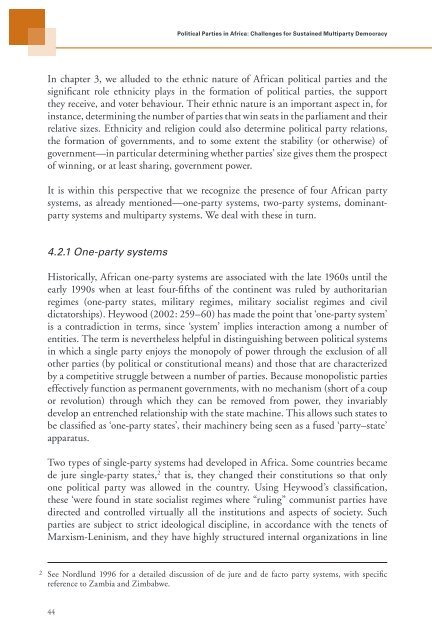Political Parties in Africa: Challenges for Sustained Multiparty
Political Parties in Africa: Challenges for Sustained Multiparty
Political Parties in Africa: Challenges for Sustained Multiparty
You also want an ePaper? Increase the reach of your titles
YUMPU automatically turns print PDFs into web optimized ePapers that Google loves.
2<br />
<strong>Political</strong> <strong>Parties</strong> <strong>in</strong> <strong>Africa</strong>: <strong>Challenges</strong> <strong>for</strong> Susta<strong>in</strong>ed <strong>Multiparty</strong> Democracy<br />
In chapter 3, we alluded to the ethnic nature of <strong>Africa</strong>n political parties and the<br />
significant role ethnicity plays <strong>in</strong> the <strong>for</strong>mation of political parties, the support<br />
they receive, and voter behaviour. Their ethnic nature is an important aspect <strong>in</strong>, <strong>for</strong><br />
<strong>in</strong>stance, determ<strong>in</strong><strong>in</strong>g the number of parties that w<strong>in</strong> seats <strong>in</strong> the parliament and their<br />
relative sizes. Ethnicity and religion could also determ<strong>in</strong>e political party relations,<br />
the <strong>for</strong>mation of governments, and to some extent the stability (or otherwise) of<br />
government—<strong>in</strong> particular determ<strong>in</strong><strong>in</strong>g whether parties’ size gives them the prospect<br />
of w<strong>in</strong>n<strong>in</strong>g, or at least shar<strong>in</strong>g, government power.<br />
It is with<strong>in</strong> this perspective that we recognize the presence of four <strong>Africa</strong>n party<br />
systems, as already mentioned—one-party systems, two-party systems, dom<strong>in</strong>antparty<br />
systems and multiparty systems. We deal with these <strong>in</strong> turn.<br />
4.2.1 One-party systems<br />
Historically, <strong>Africa</strong>n one-party systems are associated with the late 1960s until the<br />
early 1990s when at least four-fifths of the cont<strong>in</strong>ent was ruled by authoritarian<br />
regimes (one-party states, military regimes, military socialist regimes and civil<br />
dictatorships). Heywood (2002: 259–60) has made the po<strong>in</strong>t that ‘one-party system’<br />
is a contradiction <strong>in</strong> terms, s<strong>in</strong>ce ‘system’ implies <strong>in</strong>teraction among a number of<br />
entities. The term is nevertheless helpful <strong>in</strong> dist<strong>in</strong>guish<strong>in</strong>g between political systems<br />
<strong>in</strong> which a s<strong>in</strong>gle party enjoys the monopoly of power through the exclusion of all<br />
other parties (by political or constitutional means) and those that are characterized<br />
by a competitive struggle between a number of parties. Because monopolistic parties<br />
effectively function as permanent governments, with no mechanism (short of a coup<br />
or revolution) through which they can be removed from power, they <strong>in</strong>variably<br />
develop an entrenched relationship with the state mach<strong>in</strong>e. This allows such states to<br />
be classified as ‘one-party states’, their mach<strong>in</strong>ery be<strong>in</strong>g seen as a fused ‘party–state’<br />
apparatus.<br />
Two types of s<strong>in</strong>gle-party systems had developed <strong>in</strong> <strong>Africa</strong>. Some countries became<br />
de jure s<strong>in</strong>gle-party states, 2 that is, they changed their constitutions so that only<br />
one political party was allowed <strong>in</strong> the country. Us<strong>in</strong>g Heywood’s classification,<br />
these ‘were found <strong>in</strong> state socialist regimes where “rul<strong>in</strong>g” communist parties have<br />
directed and controlled virtually all the <strong>in</strong>stitutions and aspects of society. Such<br />
parties are subject to strict ideological discipl<strong>in</strong>e, <strong>in</strong> accordance with the tenets of<br />
Marxism-Len<strong>in</strong>ism, and they have highly structured <strong>in</strong>ternal organizations <strong>in</strong> l<strong>in</strong>e<br />
See Nordlund 1996 <strong>for</strong> a detailed discussion of de jure and de facto party systems, with specific<br />
reference to Zambia and Zimbabwe.
















